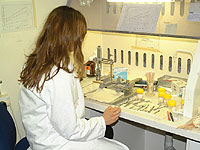Biological Chemistry for Optometry Students - CHEM1829
Faculty: Faculty of Science
School: School of Chemistry
Course Outline: http://www.chem.unsw.edu.au/
Campus: Sydney
Career: Undergraduate
Units of Credit: 6
EFTSL: 0.12500 (more info)
Indicative Contact Hours per Week: 6
Enrolment Requirements:
Prerequisite: CHEM1031, and enrolment in 3952 Optometry / Science or a Vision Science major.
CSS Contribution Charge: 2 (more info)
Tuition Fee: See Tuition Fee Schedule
Further Information: See Class Timetable
View course information for previous years.
Description
A key part of biological chemistry is to study the speed of chemical reactions providing a strong foundation for material covered later in the course. The course introduces modern structure determination methods and the concepts of stereochemistry, which are important in understanding the shape and structure of chemicals. The next section of the course provides an introduction to transition metals chemistry. Transition metal compounds, d-element electron configuration, new metal bonding theories, transition metals and colours and the key reaction mechanisms exhibited by transition metal chemistry are discussed. The next section of the course deals with the chemistry of carbon-containing compounds and their reactions. Students are introduced to a range of chemistry that enables their preparation of new molecules starting from readily available materials. The course then gives a summary of how these concepts are applicable to the chemistry of amino acids, proteins, carbohydrates, nucleic acids and lipids. The final section of this course introduces students to the field of Biological organic chemistry, including enzymology, bioenergetics, carbohydrate metabolism, oxidative phosphorylation, metabolism and hormone function.
Note: Restricted to programs 3952 and students doing a Vision Science major.









